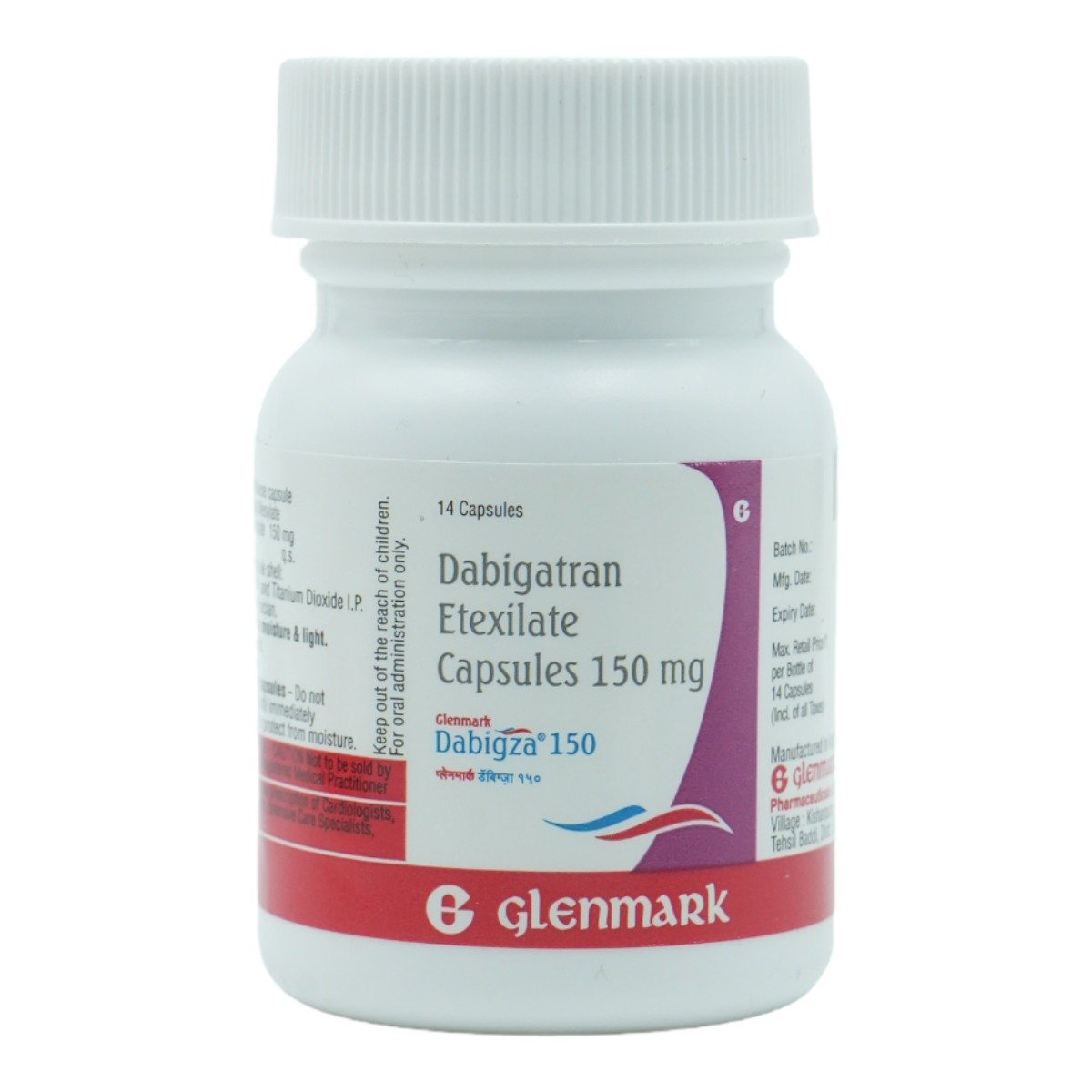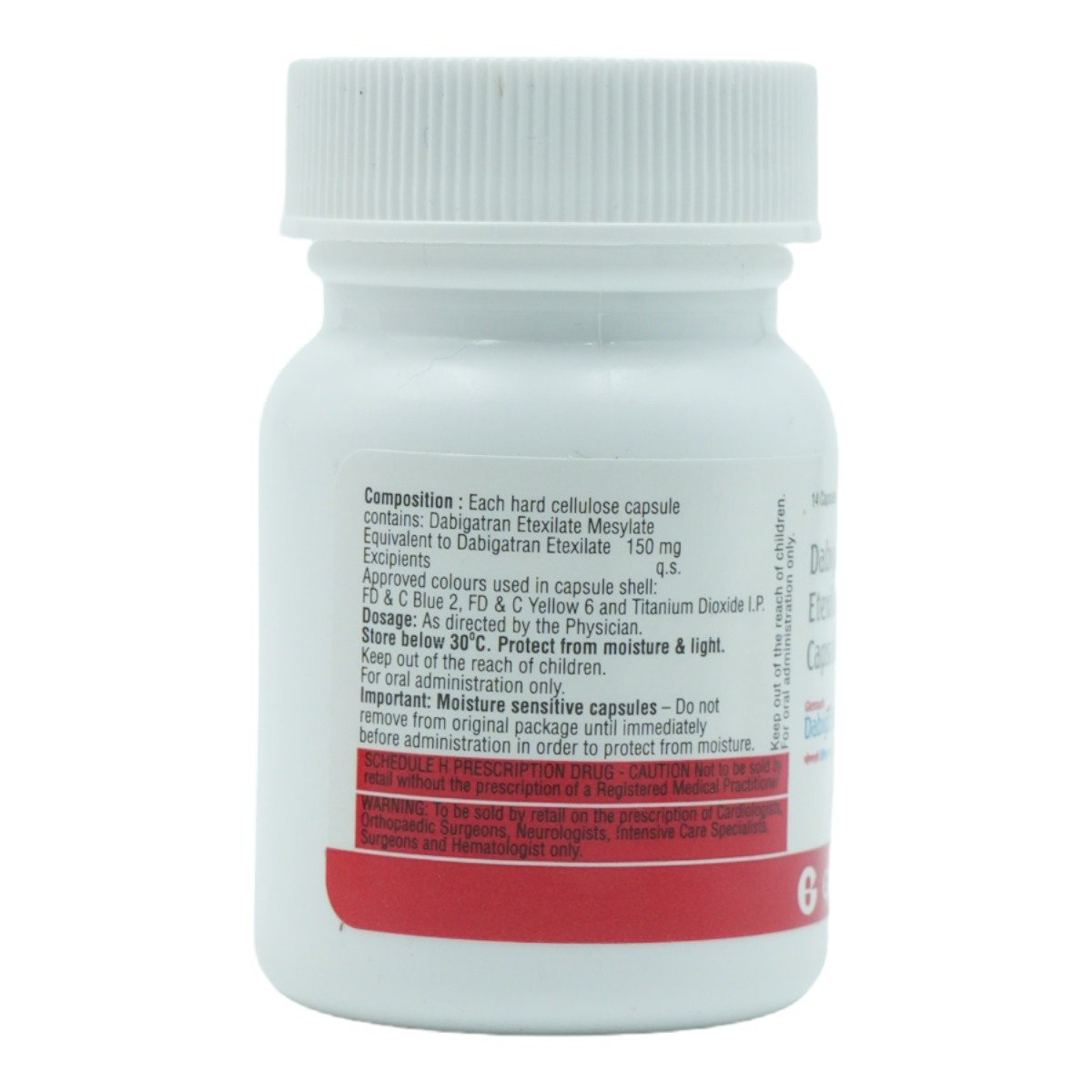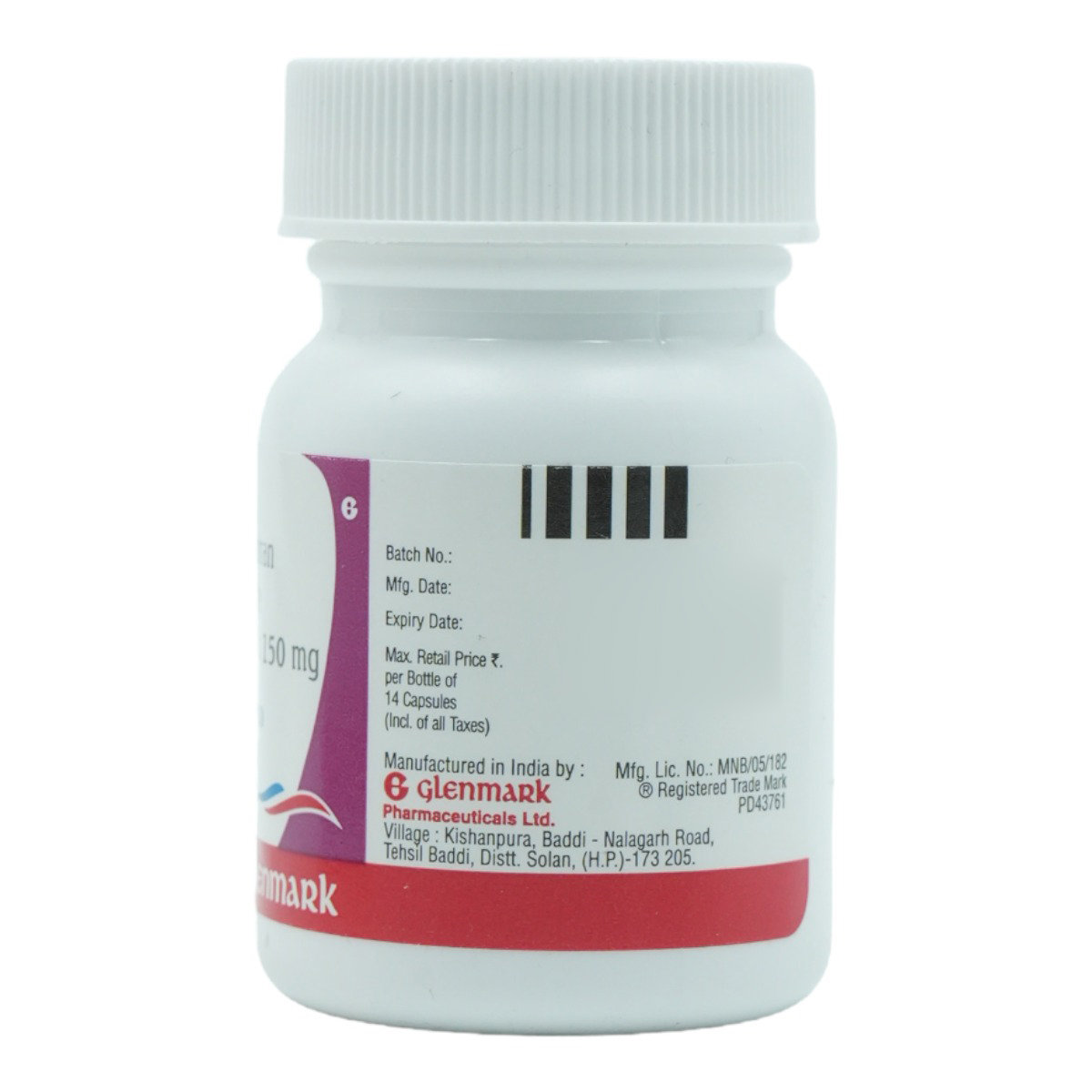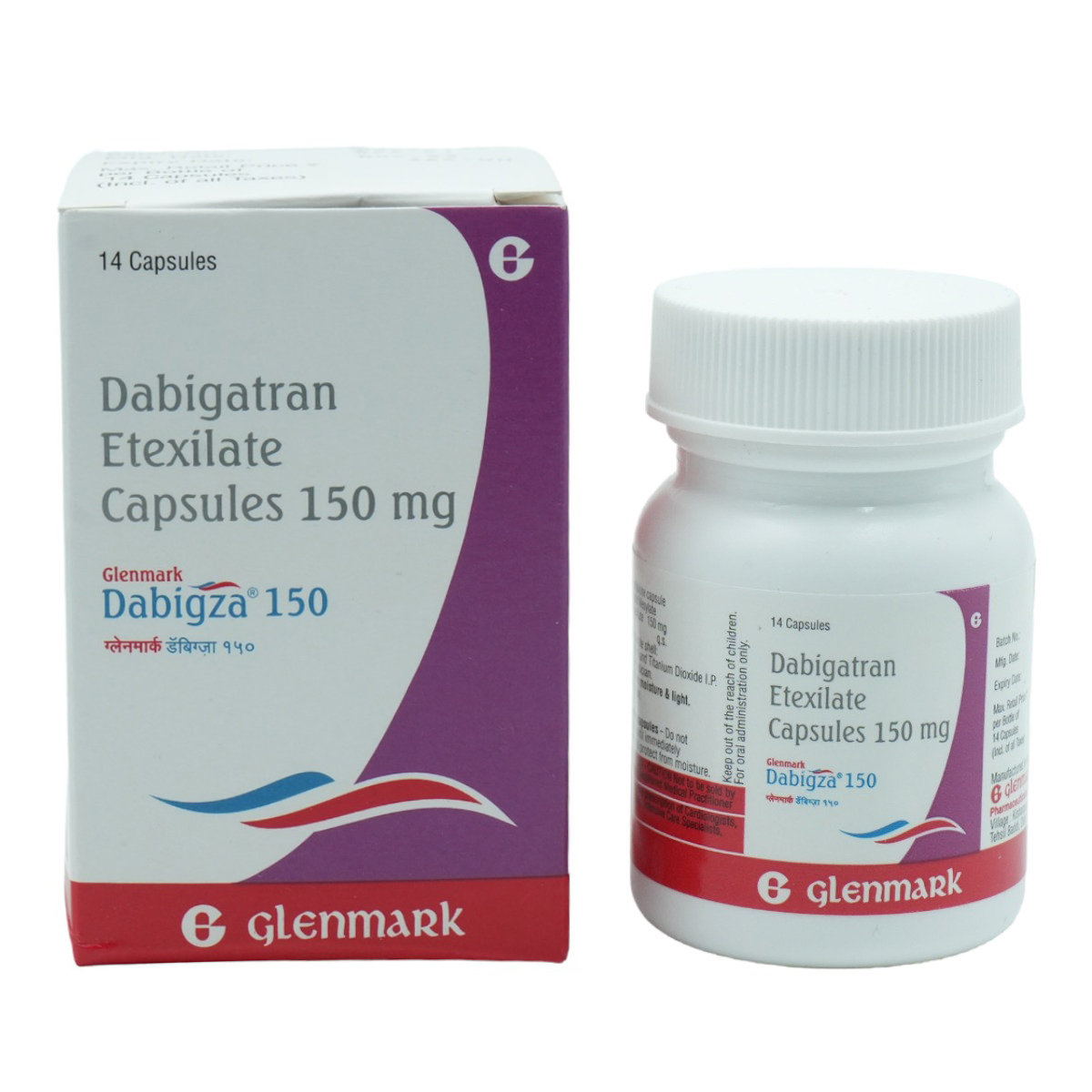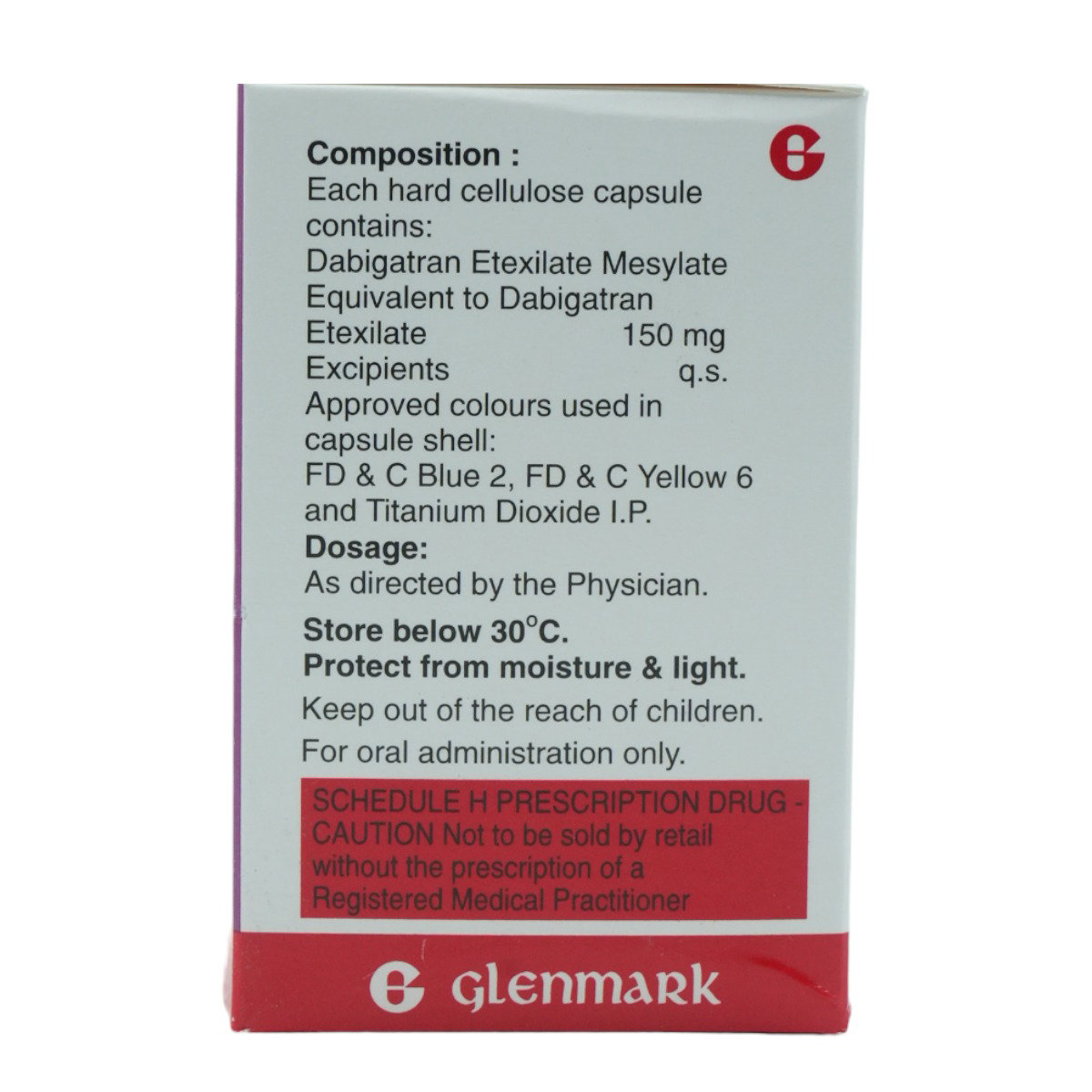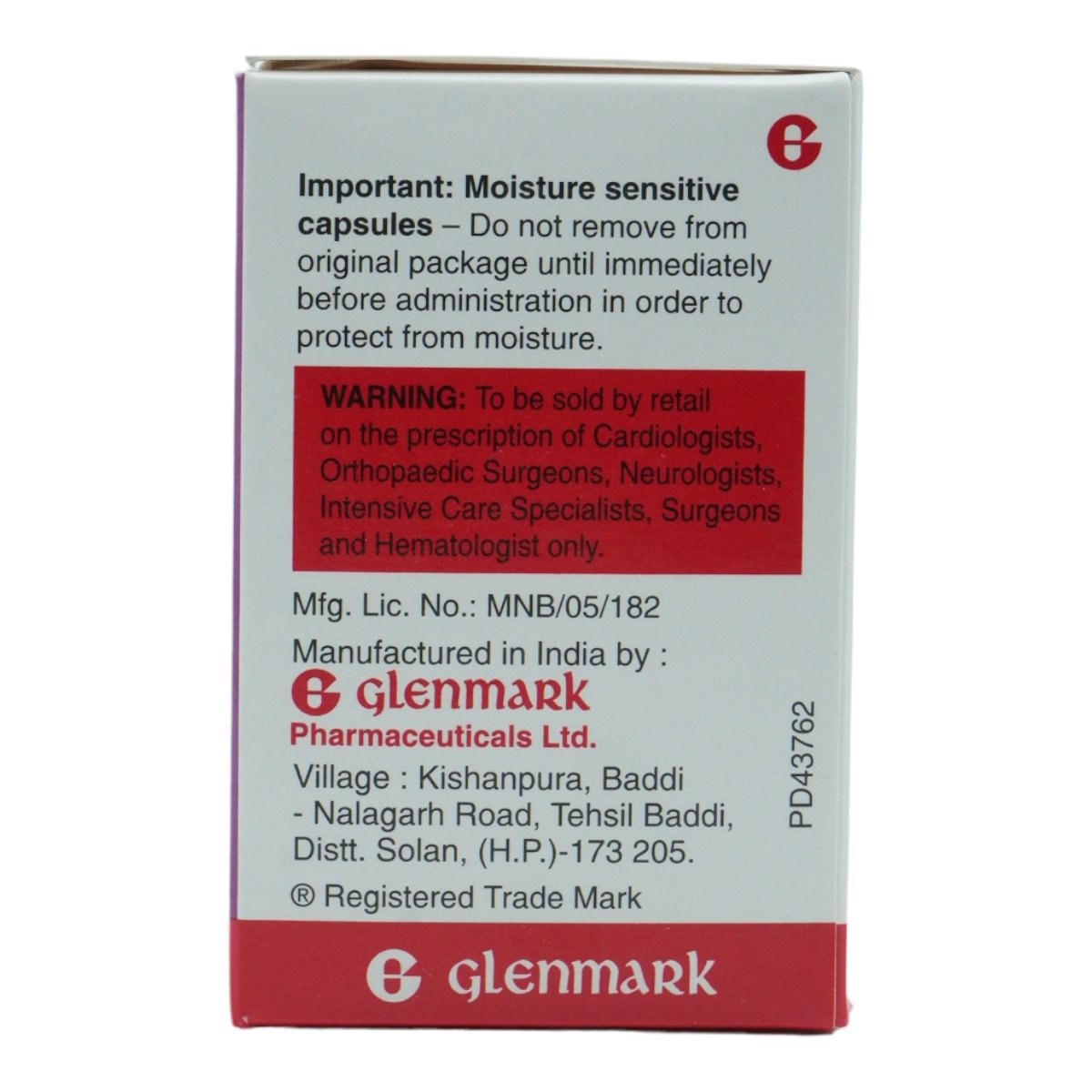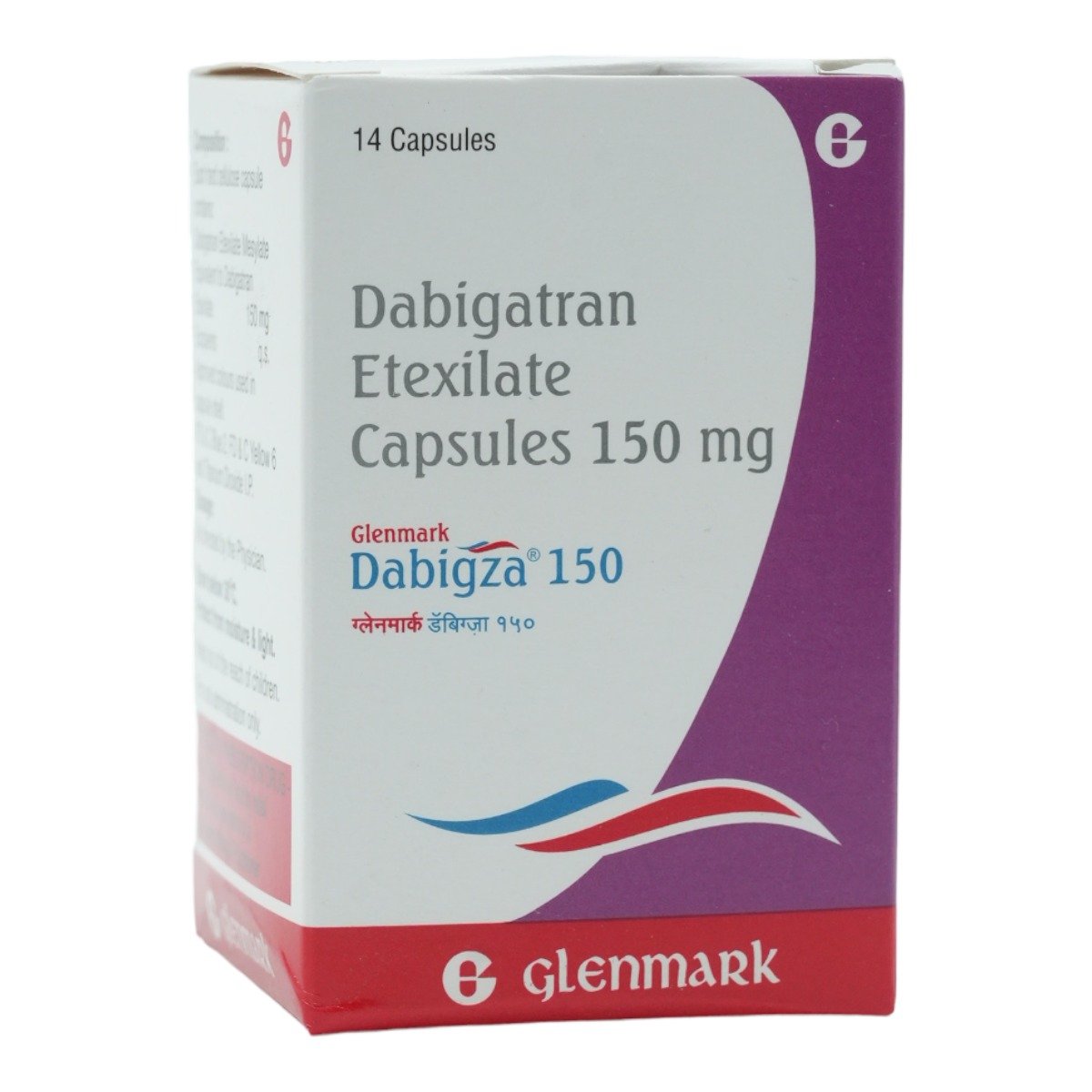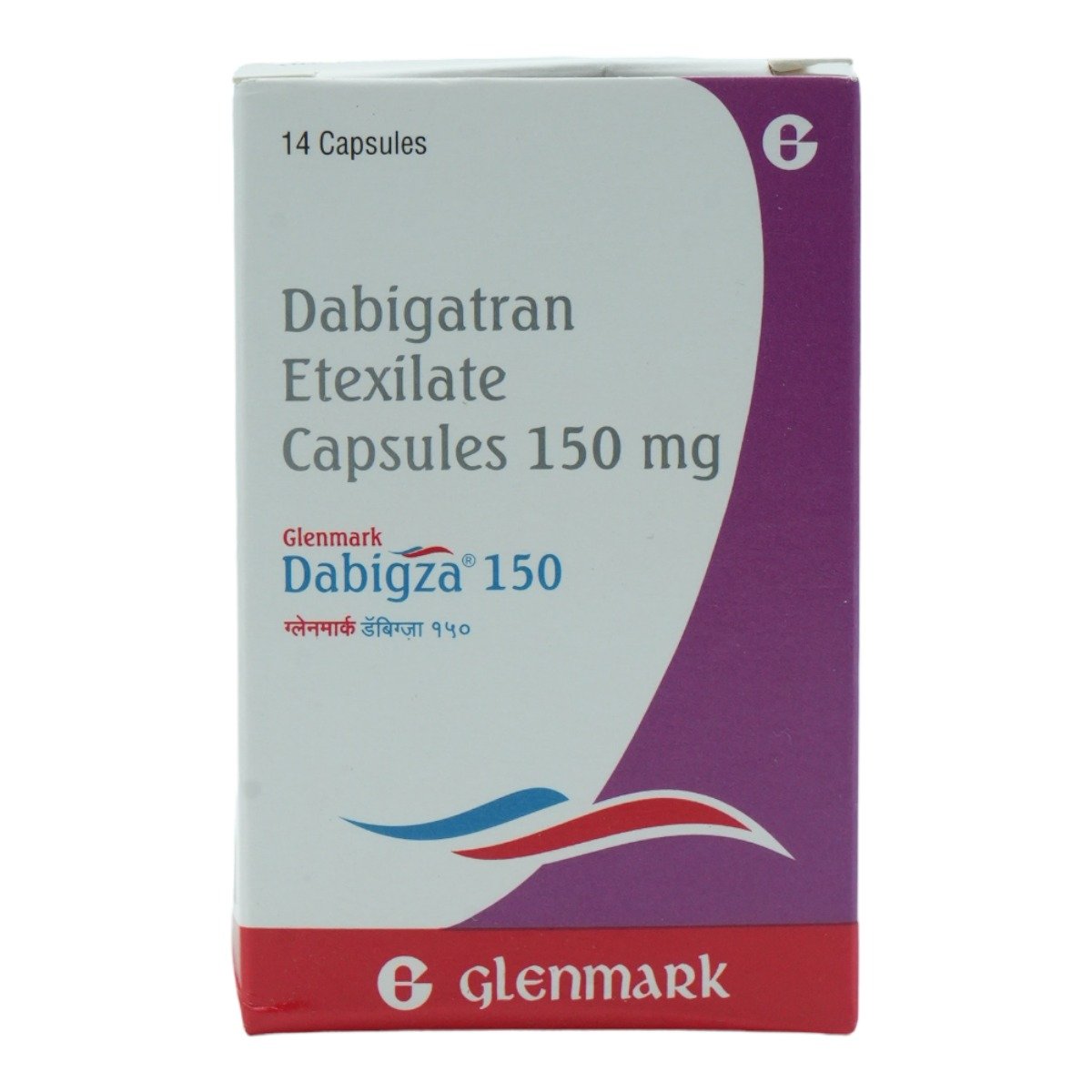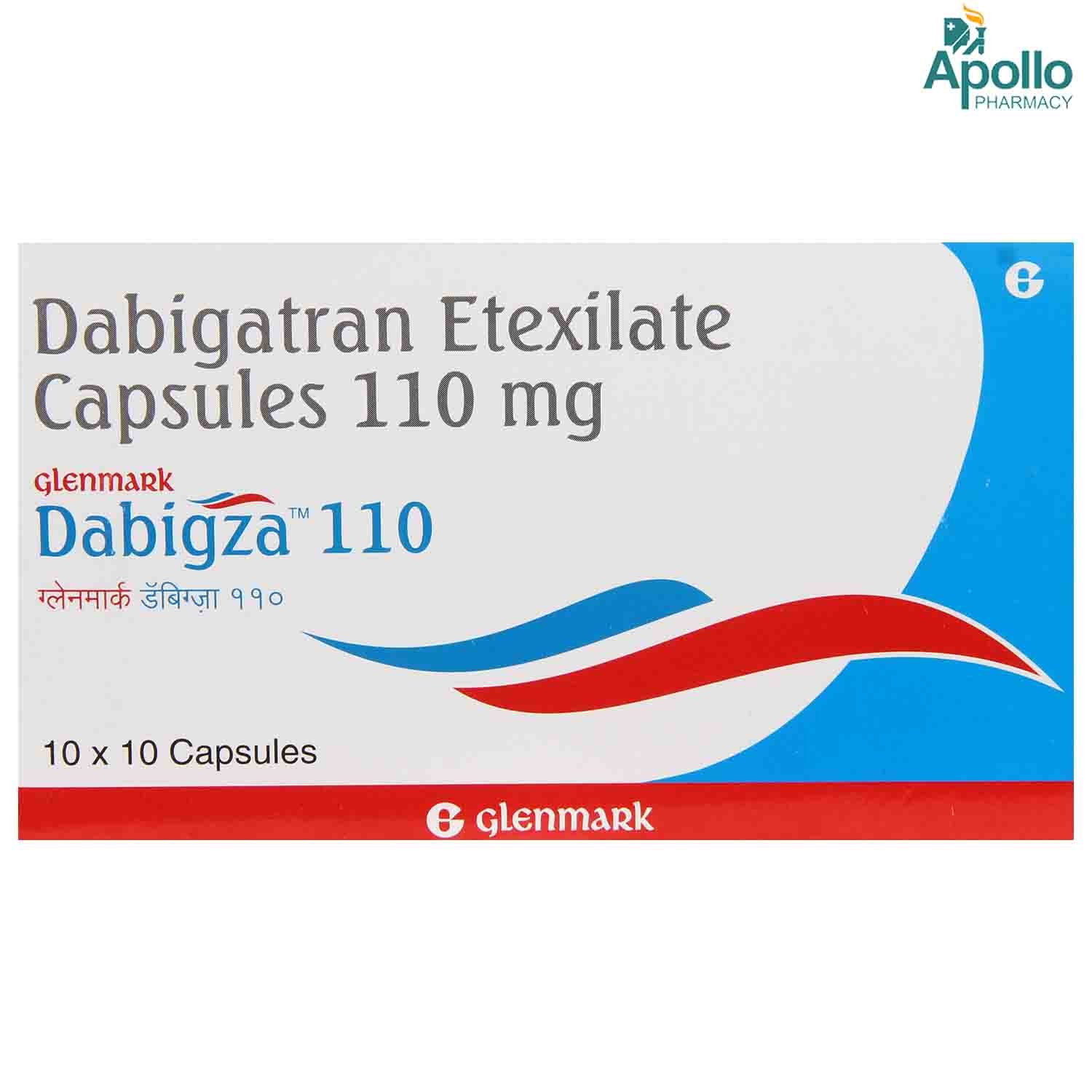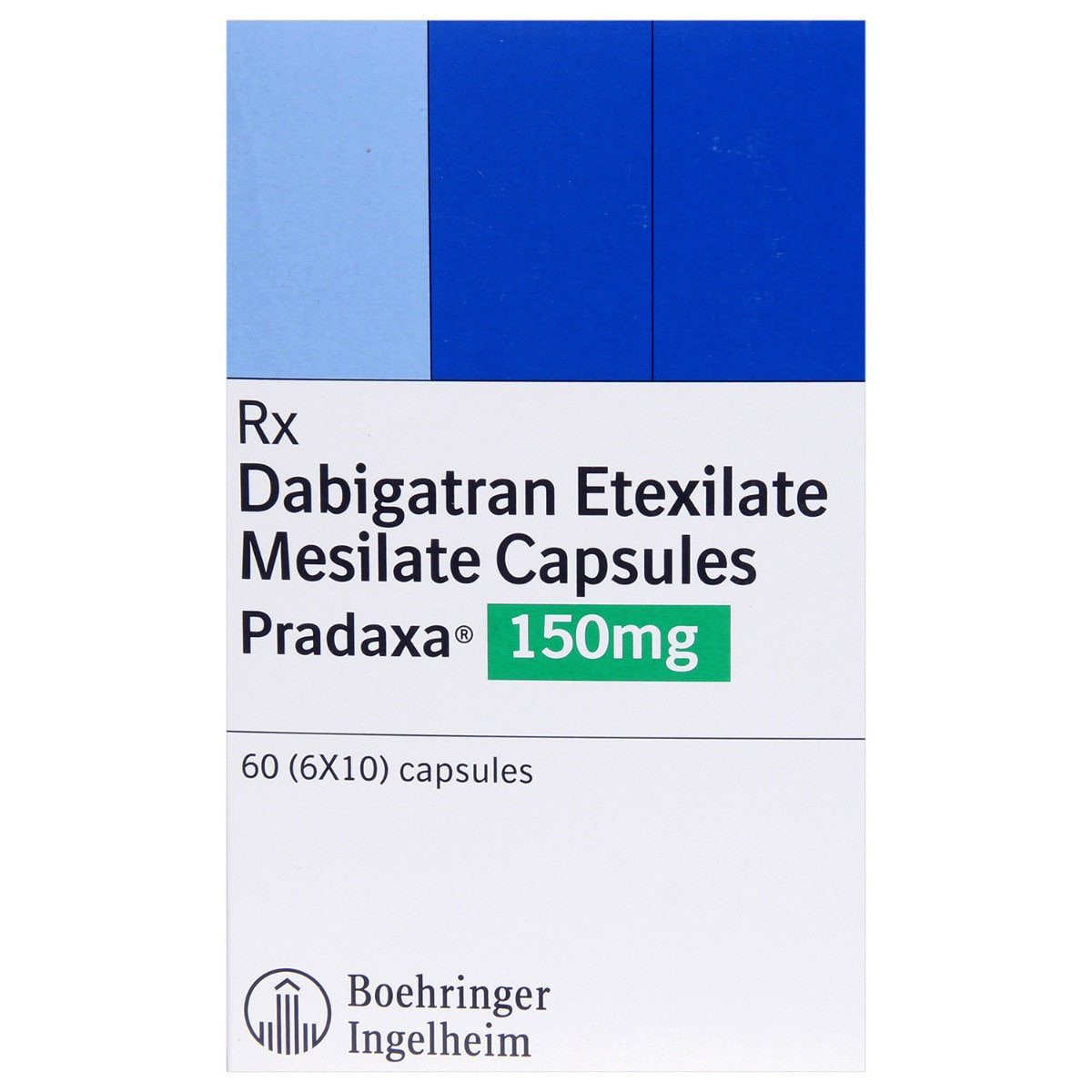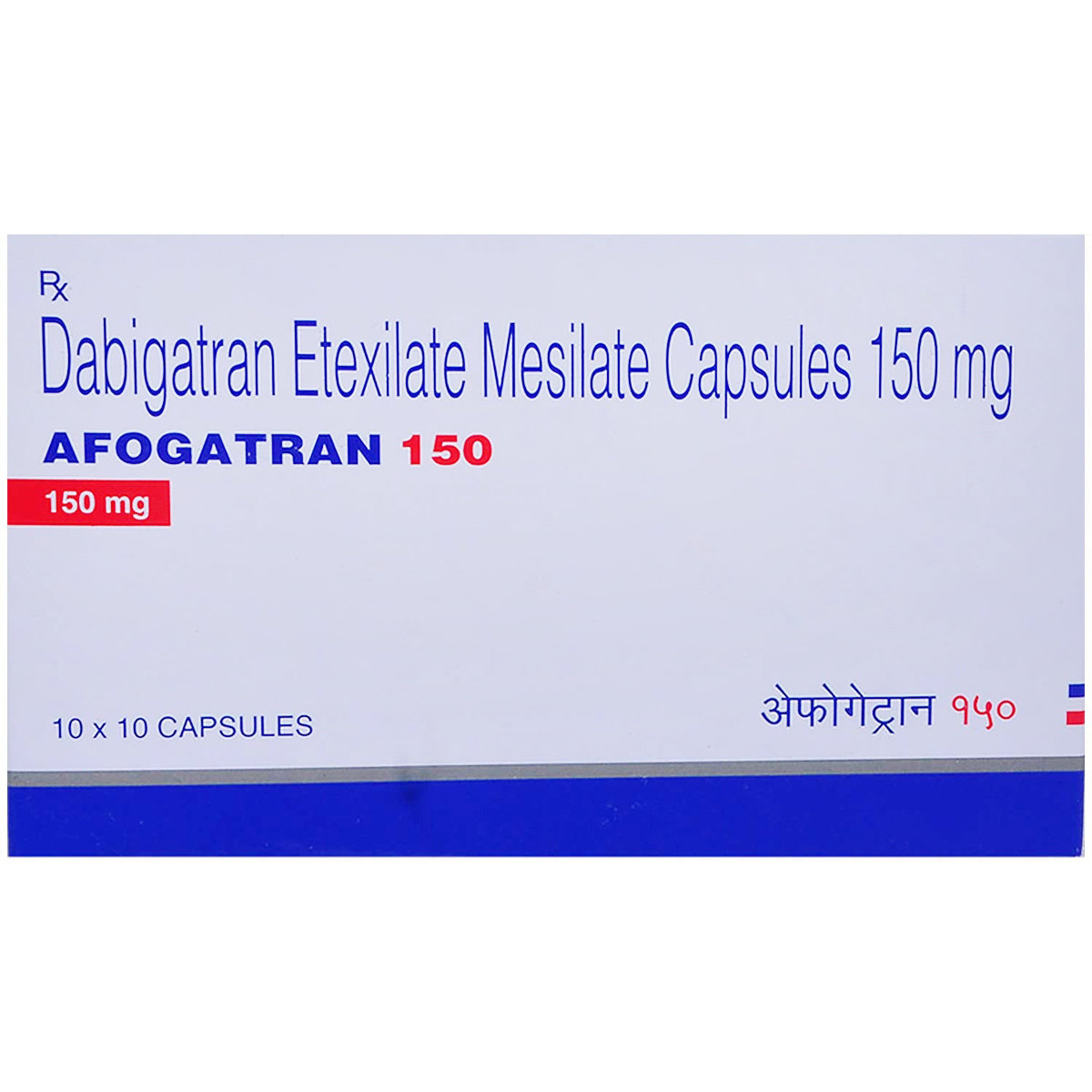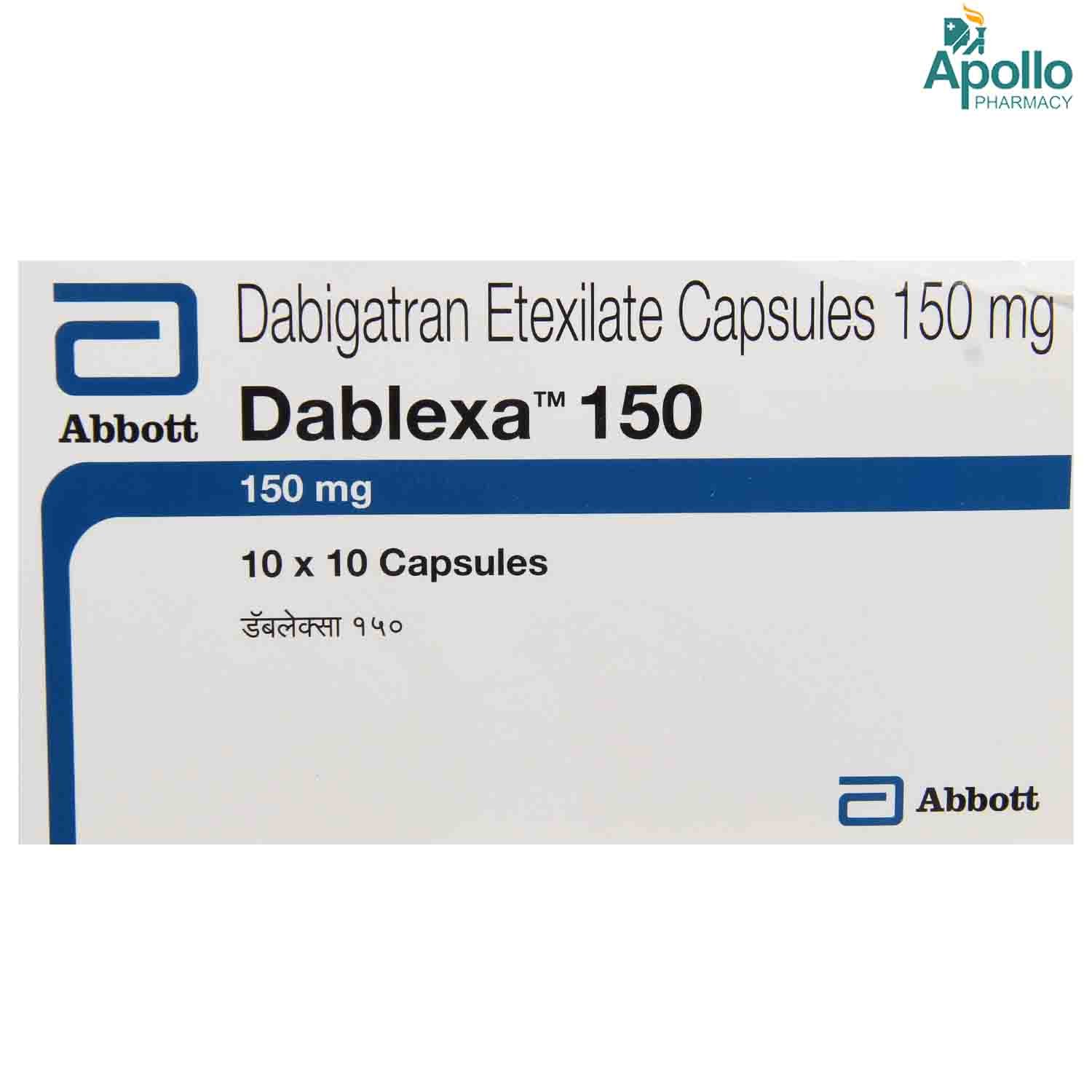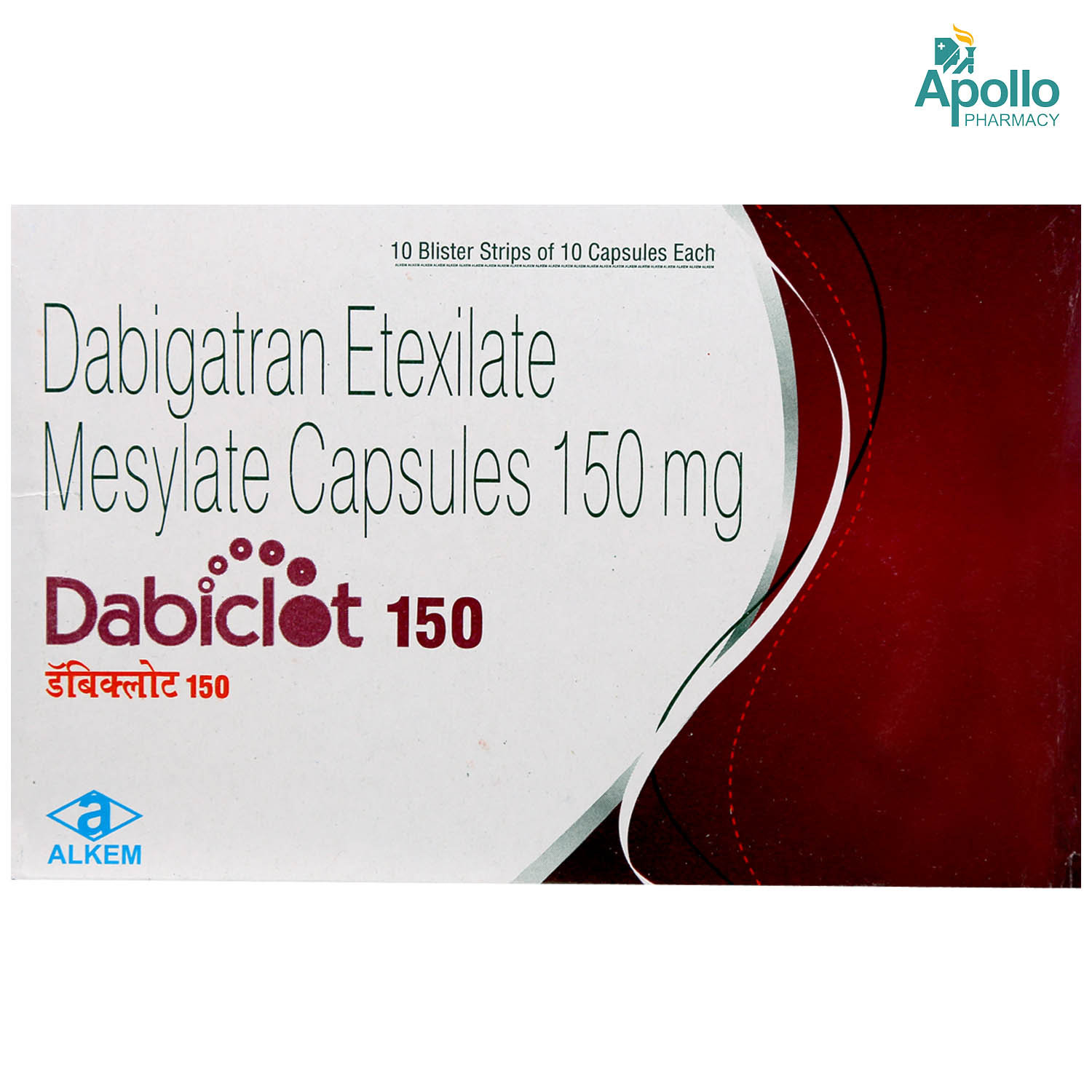Dabigza 150 Capsule 14's
MRP ₹433
(Inclusive of all Taxes)
₹65.0 Cashback (15%)
Selected Pack Size:14
14 ₹389.7
(₹27.84 per unit)
In Stock
10 ₹415.8
(₹41.58 per unit)
Out of stock
Provide Delivery Location
Online payment accepted
 Prescription drug
Prescription drugWhats That
Composition :
Manufacturer/Marketer :
Consume Type :
Expires on or after :
Return Policy :
About Dabigza 150 mg Capsule
Dabigza 150 mg Capsule belongs to a class of drugs known as anticoagulants or blood thinners used to prevent and treat the risk of stroke, heart attack in patients with atrial fibrillation (irregular heart rhythm) by reducing blood clot formation. Besides this, it is also used to prevent deep vein thrombosis (blood clots in leg veins), pulmonary embolism (blood clots in the lung), and to reduce the risk of clots in people who have undergone knee or hip replacement surgeries.
Dabigza 150 mg Capsule contains Dabigatran etexilate that works by inhibiting the production of clotting factor Xa, also called thrombin. This prevents the conversion of fibrinogen (soluble protein) to fibrin (insoluble protein), thereby preventing blood clots formation. It makes the blood flow easily through the veins making it less likely to form a serious blood clot. Thus, Dabigza 150 mg Capsule helps prevent blood clots thereby reducing the risk of heart attack/stroke.
Take Dabigza 150 mg Capsule as prescribed by your doctor. You are advised to take Dabigza 150 mg Capsule for as long as your doctor has prescribed it for you depending on your medical conditions. You may experience bleeding, anaemia (low number of red blood cells), nausea, stomach pain, and vomiting. Most of these side effects of Dabigza 150 mg Capsule do not require medical attention and gradually resolve over time. However, if the side effects are persistent, reach out to your doctor.
If you are known to be allergic to Dabigza 150 mg Capsule or any other medicines, please tell your doctor. If you are pregnant or breastfeeding, it is advised to consult a doctor before using Dabigza 150 mg Capsule . If you have a stomach ulcer, kidney or liver problems, high blood pressure, or bleeding problems, inform your doctor before taking Dabigza 150 mg Capsule . Try not to stop taking this medicine on your own. Discontinuing Dabigza 150 mg Capsule may worsen your condition and increase the risk of heart attack, and stroke.
Uses of Dabigza 150 mg Capsule
Directions for Use
Key Benefits
Dabigza 150 mg Capsule belongs to a class of drugs known as anticoagulants or blood thinners. Dabigza 150 mg Capsule is primarily used to prevent and treat the risk of stroke and heart attack by reducing blood clot formation. Besides this, it also reduces the risk of getting clots in people who have undergone knee or hip replacement surgeries. Dabigza 150 mg Capsule works by stopping the action of clotting factor (thrombin). This prevents the conversion of fibrinogen (soluble protein) to fibrin (insoluble protein), thereby preventing blood clots formation.
Storage
- Take medications with food (if recommended): It can help prevent stomach distress and indigestion.
- Eat smaller, more frequent meals: Divide daily food intake into smaller, more frequent meals to ease digestion.
- Avoid trigger foods: Identify and avoid foods that trigger indigestion, such as spicy, fatty, or acidic foods.
- Stay upright after eating: Sit or stand upright for at least 1-2 hours after eating to prevent stomach acid from flowing into the oesophagus.
- Avoid carbonated drinks: Avoid drinking carbonated beverages, such as soda or beer, which can worsen indigestion.
- Manage stress: To alleviate indigestion, engage in stress-reducing activities like deep breathing exercises or meditation.
- Consult a doctor if needed: If indigestion worsens or persists, consult a healthcare professional to adjust the medication regimen or explore alternative treatments.
- Drink water or other clear fluids.
- To prevent worsening of pain, limit intake of tea, coffee, or alcohol.
- Include bland foods like rice, toast, crackers, and rice in your diet.
- Avoid lying down immediately after eating as it may cause indigestion or heartburn.
- Avoid acidic and spicy food as it may cause indigestion.
- Avoid other medicines that increase the risk of bleeding.
- Use an electric razor and a soft-bristled toothbrush.
- Monitor for signs of bleeding like bleeding gums, unusual bruising, blood in stool, nosebleeds, or heavy menstrual bleeding.
- If you experience severe bleeding, apply direct pressure on the wound and consult a doctor promptly.
- If the risk of bleeding is high, discuss with your doctor about possibility of switching to different medicine with a lower bleeding risk.
- Inform Your Doctor: Notify your doctor immediately about your diarrhoea symptoms. This allows them to adjust your medication or provide guidance on managing side effects.
- Stay Hydrated: Drink plenty of fluids to replace lost water and electrolytes. Choose water, clear broth, and electrolyte-rich drinks. Avoid carbonated or caffeinated beverages to effectively rehydrate your body.
- Follow a Bland Diet: Eat easy-to-digest foods to help firm up your stool and settle your stomach. Try incorporating bananas, rice, applesauce, toast, plain crackers, and boiled vegetables into your diet.
- Avoid Trigger Foods: Steer clear of foods that can worsen diarrhoea, such as spicy, fatty, or greasy foods, high-fibre foods, and dairy products (especially if you're lactose intolerant).
- Practice Good Hygiene: Maintain good hygiene to prevent the spread of infection. To stay healthy, wash your hands frequently, clean and disinfect surfaces regularly, and avoid exchanging personal belongings with others.
- Take Anti-Diarrheal Medications: If your doctor advises, anti-diarrheal medications such as loperamide might help manage diarrhoea symptoms. Always follow your doctor's directions.
- Keep track of your diarrhoea symptoms. If they don't get better or worse or are accompanied by severe stomach pain, blood, or dehydration signs (like extreme thirst or dark urine), seek medical help.
Drug Warnings
If you are known to be allergic to Dabigza 150 mg Capsule or any other medicines, please tell your doctor. If you are pregnant or breastfeeding, it is advised to consult a doctor before using Dabigza 150 mg Capsule . Dabigza 150 mg Capsule is not recommended for children less than 18 years of age as the Safety and effectiveness have not been established. If you have an artificial heart valve, stomach ulcer, kidney/liver problems, high blood pressure, or bleeding problems, inform your doctor before taking Dabigza 150 mg Capsule . You should inform the doctor that you are taking Dabigza 150 mg Capsule if you are due to undergo surgery. Avoid consumption of alcohol while taking Dabigza 150 mg Capsule as it may increase the risk of stomach bleeding.
Drug-Drug Interactions
Drug-Drug Interactions
Login/Sign Up
When Mifepristone is taken with Dabigza 150 Capsule, it may increase the risk of severe vaginal bleeding in women.
How to manage the interaction:
Taking Mifepristone with Dabigza 150 Capsule is not recommended, but it can be taken if prescribed by the doctor. However, if you experience heavy, persistent vaginal bleeding, consult the door. Do not stop using any medications without talking to a doctor.
Coadministration of Warfarin with Dabigza 150 Capsule can increase the risk of bleeding.
How to manage the interaction:
Although there is a possible interaction between Dabigza 150 Capsule and warfarin, you can take these medicines together if prescribed by a doctor. However, if you notice unusual bleeding or bruising, vomiting, blood in your urine or stools, headache, dizziness, or weakness, contact a doctor immediately. Do not stop using any medications without consulting a doctor.
Taking Dabigza 150 Capsule with Tinzaparin can increase the risk of bleeding leading to serious blood loss.
How to manage the interaction:
Taking Dabigza 150 Capsule with Tinzaparin together can possibly result in an interaction, but it can be taken if your doctor has advised it. However, if you experience unusual bleeding or bruising, dizziness, lightheadedness, red or black, tarry stools, coughing up or vomiting fresh or dried blood that looks like coffee grounds, severe headache, and weakness, consult the doctor. Do not stop using any medications without a doctor's advice.
Taking Dabigza 150 Capsule with Prasugrel can increase the risk of bleeding leading to serious blood loss.
How to manage the interaction:
Although taking Prasugrel and Dabigza 150 Capsule together can evidently cause an interaction, it can be taken if a doctor has suggested it. However, if you experience unusual bleeding or bruising, dizziness, lightheadedness, red or black, tarry stools, coughing up or vomiting fresh or dried blood that looks like coffee grounds, severe headache, and weakness, consult the doctor. Do not stop using any medications without a doctor's advice.
Taking Dabigza 150 Capsule with Abciximab can increase the risk of bleeding leading to serious blood loss.
How to manage the interaction:
Taking Dabigza 150 Capsule with Abciximab together can possibly result in an interaction, but it can be taken if your doctor has advised it. However, if you experience unusual bleeding or bruising, dizziness, lightheadedness, red or black, tarry stools, coughing up or vomiting fresh or dried blood that looks like coffee grounds, severe headache, and weakness, consult the doctor. Do not stop using any medications without a doctor's advice.
Coadministration of Piroxicam with Dabigza 150 Capsule can increase the risk of bleeding.
How to manage the interaction:
There may be a possibility of interaction between Piroxicam and Dabigza 150 Capsule, but it can be taken if prescribed by a doctor. However, if you experience unusual bleeding or bruising, dizziness, lightheadedness, red or black, tarry stools, coughing up or vomiting fresh or dried blood that looks like coffee grounds, severe headache, and weakness, consult the doctor. Do not stop using any medications without talking to a doctor.
Taking Dabigza 150 Capsule with Danaparoid can increase the risk of bleeding leading to serious blood loss.
How to manage the interaction:
Taking Dabigza 150 Capsule with Danaparoid together can possibly result in an interaction, but it can be taken if your doctor has advised it. However, if you experience unusual bleeding or bruising, dizziness, lightheadedness, red or black, tarry stools, coughing up or vomiting fresh or dried blood that looks like coffee grounds, severe headache, and weakness, consult the doctor. Do not stop using any medications without a doctor's advice.
When Dabigza 150 Capsule is taken with Dronedarone, the amount of Dabigza 150 Capsule in the blood can go up.
How to manage the interaction:
Taking Dabigza 150 Capsule with Dronedarone together can possibly result in an interaction, but it can be taken if your doctor has advised it. However, if you experience paleness, fatigue, dizziness, fainting, unusual bruising or bleeding, fever, chills, diarrhea, sore throat, muscle aches, breathing difficulty, blood in coughing fluid, red or inflamed skin, body sores, and pain or burning during urination, consult the doctor.
Taking Flurbiprofen with Dabigza 150 Capsule can increase the risk of bleeding and hemorrhage.
How to manage the interaction:
Although taking Flurbiprofen and Dabigza 150 Capsule together can evidently cause an interaction, it can be taken if your doctor has suggested it. If you experience bleeding, feeling dizzy or lightheaded, dark or sticky stools, throwing up blood, severe headache, or feeling weak contact your doctor immediately. Do not stop using any medications without first talking to your doctor.
Taking Dabigza 150 Capsule with Ticlopidine can increase the risk of bleeding leading to serious blood loss.
How to manage the interaction:
Taking Dabigza 150 Capsule with Ticlopidine together can possibly result in an interaction, but it can be taken if your doctor has advised it. However, if you experience unusual bleeding or bruising, dizziness, lightheadedness, red or black, tarry stools, coughing up or vomiting fresh or dried blood that looks like coffee grounds, severe headache, and weakness, consult the doctor. Do not stop using any medications without a doctor's advice.
Drug-Food Interactions
Drug-Food Interactions
Login/Sign Up
St. John’S Wort, Garlic Pill
How to manage the interaction:
Herbs and supplements may interact with Dabigza 150 Capsule. Avoid St. John's Wort, herbs including garlic, ginger, bilberry, danshen, piracetam, and ginkgo biloba during Dabigza 150 Capsule treatment.
Diet & Lifestyle Advise
- Keep your cholesterol and triglyceride levels under control.
- Eat at regular intervals, and maintain a healthy diet that includes fresh fruits, vegetables.
- Limit alcohol intake since it raises blood pressure and increases the risk of heart diseases.
- Keep a check on your weight and exercise regularly to keep your heart healthy.
Side Effects of Dabigza 150 mg Capsule
- Stomach pain
- Vomiting
- Bleeding
- Anaemia (low number of red blood cells)
- Nausea
- Diarrhoea
Habit Forming
Therapeutic Class
All Substitutes & Brand Comparisons
RX
Dabifib 150 mg Capsule 10's
Msn Laboratories Pvt Ltd
₹289
(₹25.43 per unit)
8% CHEAPERRX
Out of StockDabanex 150Mg Capsule 10'S
Ajanta Pharma Ltd
₹295
(₹26.55 per unit)
4% CHEAPERRX
Out of StockDabiac-150mg Capsule 10's
Chemo Healthcare Pvt Ltd
₹299
(₹26.91 per unit)
3% CHEAPER
Drug-Diseases Interactions
Drug-Diseases Interactions
Login/Sign Up
FAQs
Drug-Drug Interactions Checker List
- WARFARIN
- PHENPROCOUMON
- ACENOCOUMAROL
- HEPARIN
- CLOPIDOGREL
- PRASUGREL
- TICAGRELOR
- RIVAROXABAN
- AMIODARONE
- DRONEDARONE
- QUINIDINE
- VERAPAMIL
- ITRACONAZOLE
- KETOCONAZOLE
- TACROLIMUS
- CYCLOSPORINE
- INDINAVIR
- RITONAVIR
- RIFAMPICIN
- CLARITHROMYCIN
- GLECAPREVIR
- PIBRENTASVIR
- IBUPROFEN
- DICLOFENAC
- PHENYTOIN
- CARBAMAZEPINE
Special Advise
- You should have regular platelet count, factor V assay, fibrinogen level test, prothrombin time test (PT or PT-INR), and the INR (international normalized ratio) to analyze your blood clotting time.
-
In case you miss a dose of Dabigza 150 mg Capsule , take it as soon as possible. However, if it is too close to the next dose, revert to the original schedule.
Disease/Condition Glossary
Thrombosis/Blood Clot: A blood clot can occur in any part of the body and can lead to a heart attack, stroke, or damage to organs. Blood clots can reach the arteries or veins in the organs like the brain, kidney, heart, lungs, and limbs. Conditions like atherosclerosis, diabetes, heart failure, irregular heartbeat (arrhythmia), and obesity/overweight can trigger excessive blood clotting in the brain and heart.
Deep vein thrombosis (blood clots in legs): It is a medical condition in which blood clots form in deep veins, usually in the legs. The symptoms include leg pain or swelling.
Pulmonary embolism (blood clots in the lung): It is a chronic condition that occurs as the blood clots break and travel to the lungs from deep veins in the legs or other parts of the body. The symptoms of pulmonary embolism include cough, chest pain, and shortness of breath.
Stroke (blood clots in the brain): It occurs when the supply of blood to part of your brain is stopped or reduced. This prevents brain tissue from getting nutrients and oxygen leading to the death of brain cells.
Heart attack: A heart attack means the death of heart tissue due to a shortage of blood supply to the heart muscles. This can occur when there is an accumulation of cholesterol or fat narrowing the heart's major veins or when other substances like a blood clot are blocking the flow of blood.

Have a query?
Alcohol
Safe if prescribed
You are recommended to avoid consumption of alcohol with Dabigza 150 mg Capsule as it may increase the risk of bleeding.
Pregnancy
Consult your doctor
Please consult your doctor if you are planning to become pregnant or already pregnant before starting Dabigza 150 mg Capsule . Your doctor will prescribe Dabigza 150 mg Capsule only if the benefits outweigh the risks.
Breast Feeding
Consult your doctor
Avoid breastfeeding while taking Dabigza 150 mg Capsule . Consult your doctor if you have nay concerns.
Driving
Safe if prescribed
Dabigza 150 mg Capsule usually does not affect your ability to drive or operate machinery.
Liver
Consult your doctor
Let your doctor know if you have/had liver diseases or hepatic impairment. Your doctor will weigh the benefits and potential risks before prescribing Dabigza 150 mg Capsule . However, it is not recommended in patients with severe liver diseases.
Kidney
Consult your doctor
Let your doctor know if you have/had kidney diseases. Your doctor will weigh the benefits and potential risks before prescribing Dabigza 150 mg Capsule . However, it is not recommended in patients with severe kidney diseases.
Children
Safe if prescribed
Dabigza 150 mg Capsule is not recommended for children below the age of 18 years as the safety and efficacy of Dabigza 150 mg Capsule have not been established in children.

